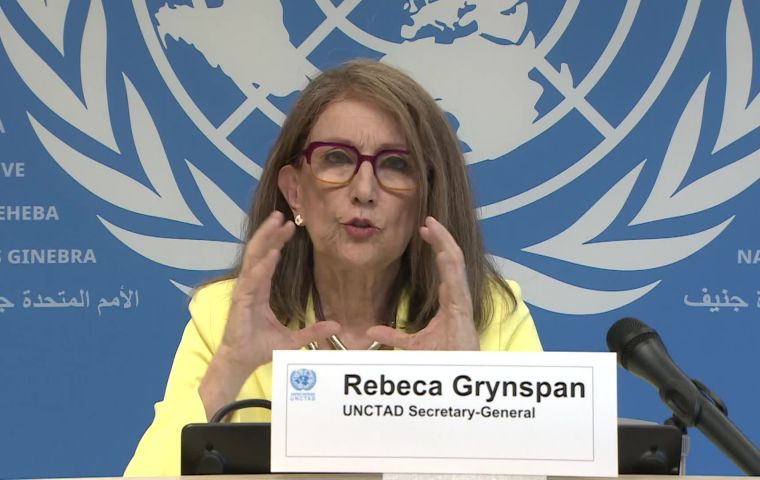MercoPress. South Atlantic News Agency
Wars and climate change to blame for slowdown in world commerce, UN official says
 Grynspan, 68, of Costa Rica was appointed the eighth UNCTAD Secretary-General on Sept. 13, 2021, thus becoming the first woman to hold this position
Grynspan, 68, of Costa Rica was appointed the eighth UNCTAD Secretary-General on Sept. 13, 2021, thus becoming the first woman to hold this position A high-ranking United Nations (UN) official warned last week that worldwide commerce was threatened by climate change and wars such as the ongoing conflict in Gaza.
UN Agency for Trade and Development (UNCTAD) Secretary-General Rebeca Grynspan of Costa Rica said Sunday during a visit to the Panama Canal that wars were causing “disruption” in the Suez Canal, the Red Sea, and the Black Sea while climate change had forced a reduction in the number of ships crossing through the passage linking the Atlantic and the Pacific Oceans. These issues resulted in more expensive maritime transport, she also explained.
However, she admitted that the situation at the Panama Canal had improved from previous months, which was very important given that 80% of world trade uses maritime transport.
“We have geopolitics on the one hand, and climate change on the other, affecting the world's main maritime routes,” she said. These “disruptions [...] affect us all, [as] they generate very important bottlenecks” and have “an impact on international inflation and the prices of the most essential goods,” she added.
The Panamanian waterway reduced in 2023 the transit of ships and the draft of vessels due to a shortage of rainfall caused by the El Niño phenomenon and aggravated by climate change.
The Panama Canal Authority (ACP) has said in a statement that from May 16 to 31, the total number of neopanamax ships (the larger ones that pass through the expansion inaugurated in 2016) would remain at 7, while panamax ships (those that pass through the century-old smaller locks) would amount to 24. As of June 1, the former category will be increased to 8, while the latter will remain at 24, for a total of 32 vessels.
Under optimal conditions, the average number of vessels is between 35 and 36. In 2022, an average of 39 ships per day was welcomed.
As of June 15, the maximum draft allowed for ships passing through the new neopanamax locks will be 13.71 meters to ensure “safe navigation,” the ACP added.
Since July 2023, daily transits have been limited due to water shortages in the artificial lakes of Gatun and Alhajuela, reaching 22 vessels in November. From March 25, a total of 27 vessels have been able to pass daily through the waterway, which serves more than 180 maritime routes connecting 170 countries and reaching some 1,920 ports worldwide. The canal, used mainly by customers from the United States, China, and Japan, has a system of locks to raise and lower ships. For every ship that passes through, 200 million gallons of fresh water are released into the ocean.
Grynspan, 68, was appointed the eighth UNCTAD Secretary-General on Sept. 13, 2021, thus becoming the first woman to hold this position.
In a separate development, UN crime prevention experts released a report Friday stating that global efforts to prevent crimes against nature and bring offenders to justice were hampered by glaring differences in environmental protection laws among countries and regions.
“Stronger legislation can help deter potential and repeat offenders and expand the range of investigative tools and resources for law enforcement to stop crimes that affect the environment,” said Angela Me, Chief of Research and Analysis at the UN Office on Drugs and Crime (UNODC), presenting the report.
“Our review shows progress globally in advancing environmental protection laws,“ said Me. However, she noted that legislation and enforcement remain uneven, creating ”opportunities for criminal groups to exploit gaps in responses.”




Top Comments
Disclaimer & comment rulesCommenting for this story is now closed.
If you have a Facebook account, become a fan and comment on our Facebook Page!